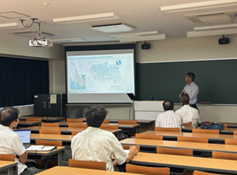トピックス
【2025.8.7 GIR公開セミナー報告】Dr. Yadu Pokhrel “Scale-adaptive Modeling of Coupled Natural-Human Hydrologic Systems”
- イベント報告
- 2025.8.18

◆講演者:Dr. Yadu Pokhrel (アメリカ、ミシガン州立大学、教授)
◆講演タイトル:”Scale-adaptive Modeling of Coupled Natural-Human Hydrologic Systems”
◆日時:2025年8月7日(金)(10:30~12:00)
◆会場:東京農工大学 府中キャンパス 農学部 2号館 2階 2-22講義室、Zoom
◆言語:英語
◆開催担当者:農学研究院 ジュリアン ブランジェ准教授 (グローバルイノベーション研究院 食料分野 ジュリアン ブランジェチーム)
◆開催案内
◆参加人数:6人
講演概要
Prof. Pokhrel gave a talk about “Scale-adaptive Modeling of Coupled Natural-Human Hydrologic Systems” at TUAT. He started by introducing his educational background and Michigan State University.
For the motivation and background of his research, Prof. Pokhrel mentioned that humans are now the primary drivers of global environment change, a fact sometimes coined as the “Anthropocene” by scholars. Within the context of hydrology this includes groundwater depletion driven by large scale irrigation, transformation of flow regime due to large dams, and water pollution owing to intensive agricultural practices. Furthermore, the imbalance between demand and supply for water is increasing, highlighting the need for “Developing science-informed adaptation/mitigation strategies toward sustainable freshwater systems!”. Lastly, the increase in the occurrence of water disasters such as droughts and floods is the need for transdisciplinary research to cope with climate extremes and enhance infrastructure resilience.
Prof. Pokhrel then showcased two studies. The first study was in the Mekong Basin and focused on the boom in hydropower and its implication for flood risk, flow regime, and water availability. The large differences in wealth among the nations sharing the Mekong River have enormous implication regarding the development of hydropower which currently prioritizes energy production over sustainability. The second study focused on the Amazon basin and investigated alternative to dams: in-stream turbine. Suitable locations consisted of zones outside protected areas, consistently under 2m of water with gentle slopes, to avoid debris damaging the devises.
Most of the question session was spent discussing funding opportunities and funding strategies between Jaan and the US. We also discussed one of Prof. Pokhrel first article which received unprecedented press coverage at the time and ask about the lesson he learned from this unique experience.
このページの上部へ